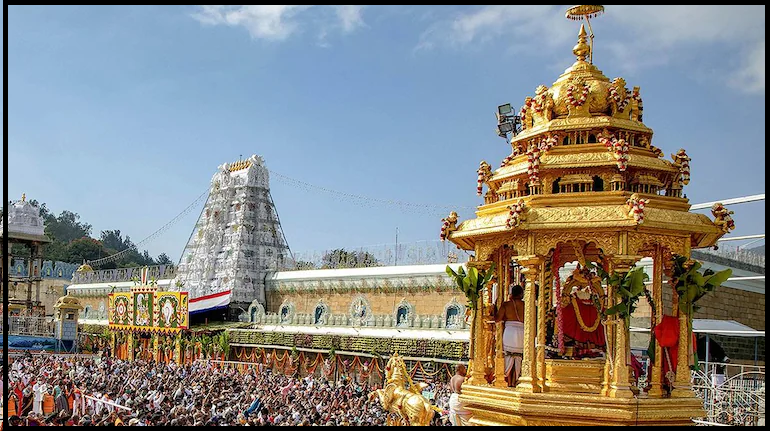
The Dissolution of the TTD Board: A New Chapter Under a New Government
In the bustling and spiritually vibrant state of Andhra Pradesh, the Tirumala Tirupati Devasthanams (TTD) Board holds a position of immense importance. Managing the affairs of the Tirumala Venkateswara Temple, one of the most revered Hindu temples globally, the TTD Board is tasked with overseeing not just the religious and spiritual activities, but also the administrative, financial, and developmental aspects of the temple complex. However, the political landscape’s dynamism often reflects in the governance of such institutions. Recently, the TTD Board was dissolved following the formation of a new state government, marking the beginning of a significant transitional phase. A new committee is set to be formed soon, with hopes high for continued progress and innovation in temple management.
The Role and Importance of the TTD Board
The TTD Board is responsible for a wide array of functions, from the upkeep and maintenance of the temple premises to the administration of the extensive pilgrim accommodation and services. The board also oversees numerous educational, medical, and social welfare activities funded by the temple’s substantial revenues. Given its vast responsibilities and the temple’s considerable wealth, the composition and functioning of the TTD Board are of critical interest to both the state’s government and the millions of devotees who visit the temple annually.
Table of Contents
Political Shifts and Their Impact
With the recent state elections ushering in a new government, the political winds have shifted, necessitating changes in various administrative bodies, including the TTD Board. Such changes are not uncommon in Indian politics, where new administrations often seek to place trusted and loyal individuals in key positions of influence. The dissolution of the existing board is a move aimed at facilitating this transition.
The outgoing board, appointed by the previous government, had overseen numerous initiatives, including infrastructural developments, digitization efforts for better pilgrim management, and enhanced transparency in financial dealings. However, the change in government brought with it a desire to re-evaluate these initiatives and possibly chart a new course for the temple’s administration.
The Dissolution Process
The formal dissolution of the TTD Board was executed through a government order, citing the need for reorganization in alignment with the new administration’s vision and priorities. The order was met with mixed reactions. Some viewed it as a necessary step for ensuring that the temple’s management aligns with the current government’s policies and objectives. Others expressed concerns about potential disruptions and the continuity of ongoing projects.
The members of the outgoing board were thanked for their services, and the government assured a smooth transition, emphasizing that the temple’s daily operations and pilgrim services would not be affected during this interim period.
Formation of a New Committee
In the wake of the board’s dissolution, the government has announced its intent to form a new committee soon. This new committee will likely comprise individuals who are not only trusted by the new administration but also possess the requisite expertise in temple management, finance, and public administration.
The process of forming the new committee involves several steps:
1. Nominations and Appointments: The government will solicit nominations from various quarters, including political allies, religious leaders, and community representatives. Each nominee’s credentials and past contributions will be scrutinized to ensure they meet the standards required for managing such a significant institution.
2. Consultations with Religious and Community Leaders: Given the temple’s importance to millions of devotees, consultations with prominent religious and community leaders will be crucial. Their input will help in selecting individuals who are respected and trusted by the broader community.
3. Accountability Measures: To enhance public trust, the government may introduce additional transparency and accountability measures in the selection process. This could include publicizing the selection criteria and the backgrounds of the appointed members.
4. Focus Areas for the New Committee: Once formed, the new committee will outline its focus areas, which may include improving pilgrim facilities, expanding digital services, and ensuring the temple’s finances are managed with the highest standards of transparency and accountability.
Expectations from the New Committee
The formation of the new committee brings with it a wave of expectations from various stakeholders:
Devotees: The primary expectation is the seamless continuation and enhancement of services. Pilgrims hope for better facilities, shorter waiting times, and more efficient crowd management, especially during peak seasons.
Government: The state government expects the new committee to align with its broader socio-economic and cultural policies. This includes leveraging the temple’s resources for the welfare of the surrounding communities and ensuring that the temple remains a beacon of religious harmony and social progress.
Community Leaders and Scholars: There is an expectation that the new committee will respect and preserve the rich traditions and rituals associated with the temple while also embracing modern management practices.
Challenges Ahead
The new committee will face several challenges as it takes over the reins:
– **Maintaining Continuity**: Ensuring that ongoing projects and services continue without disruption will be crucial. This includes infrastructural developments, digital initiatives, and welfare programs.
– **Balancing Tradition and Modernity**: While there is a need to modernize and improve efficiency, it is equally important to preserve the temple’s ancient traditions and rituals, which are central to its identity and significance.
– **Financial Management**: With the temple’s substantial revenues, maintaining transparency and accountability in financial dealings will be a significant responsibility. The new committee will need to ensure that funds are utilized effectively for the temple’s development and the welfare of the broader community.
In conclusion, while the dissolution of the TTD Board may have been driven by political changes, it presents an opportunity for renewed focus and innovation in temple management. The new committee, once formed, will have the challenging yet rewarding task of steering the Tirumala Venkateswara Temple into a future that honors its glorious past while embracing the possibilities of the present and the future.







